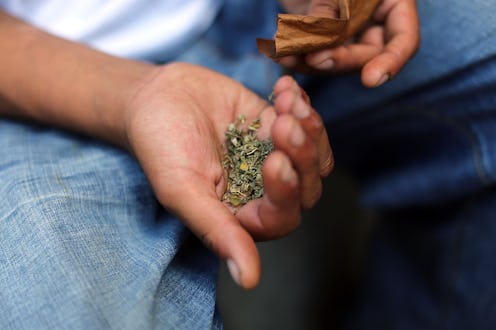News
The DOJ's Marijuana Task Force Found Nothing To Back Up Jeff Sessions' War On Weed

It's no secret that Attorney General Jeff Sessions is staunchly anti-marijuana. But while Sessions may have hoped his anti-weed task force would help him wage war on legalized weed, he may not be getting the green light to do so after all. According to an exclusive report from the Associated Press, the task force Sessions assembled to help him determine the federal government's best strategy for dealing with states that have legalized marijuana hasn't come up with anything to justify a crackdown on the drug. Rather, the task force has reportedly recommended keeping an Obama-era policy in place.
According to the Associated Press, a report from Sessions' hand-picked Task Force on Crime Reduction and Public Safety recommended little in the way of policy changes. Although neither the report nor the task force's recommendations have been made public just yet, the Associated Press reportedly obtained a portion of the report, which they claim offers "no new policy recommendations to advance the attorney general's aggressively anti-marijuana views." But while the task force offered no new policy directives, it did reportedly have one solid recommendation for authorities: keep studying the issue.
However, the secrecy surrounding reports issued by the Task Force on Crime Reduction and Public Safety hasn't sat well with some members of Congress. In a letter reportedly sent to Sessions on Tuesday, Democratic Sen. Ron Wyden urged the attorney general to make the task force's recommendations public. "The public deserves to know whether recommendations from the marijuana subcommittee are being used behind the scenes at [the Department of Justice] to justify federal actions that undermine states' rights to set their own marijuana laws," the Hill reported Wyden said in his letter.
In a statement issued in late July, Sessions confirmed he was receiving recommendations on "a rolling basis" from the task force and had "been acting on the Task Force's recommendations to set the policy of the Department." He did not elaborate on what recommendations he'd received.
Although the Associated Press is clear in noting that more recommendations may be issued by the task force down the line and, perhaps more importantly, that Sessions isn't bound by the recommendations, it also argues that "the tepid nature of the recommendations signals just how difficult it would be to change course on pot." For now, it appears the Justice Department will continue to abide by the Obama-era Cole Memo, which outlines a non-interference policy in regards to state laws as long as there is no threat to public health and safety.